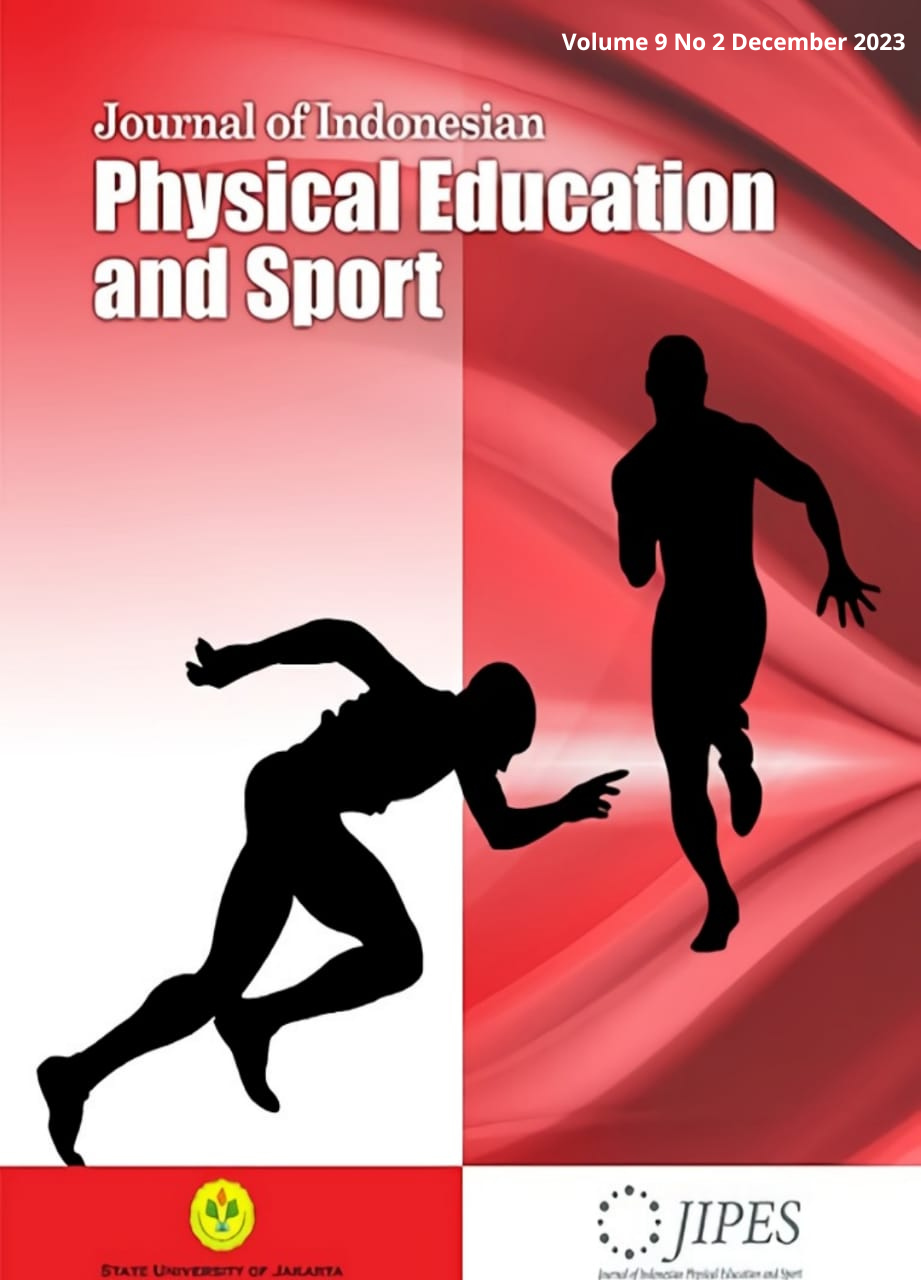Perception of Athletes on the Effects of Energy Drinks on Sports Performance in The University of Ilorin
DOI:
https://doi.org/10.21009/JIPES.092.04Keywords:
Athlete, Caffeine, Energy DrinkAbstract
The purpose of this study was to determine the perception of athletes on the effects of energy drinks on sports performance in the University of Ilorin. The respondents for the study were seventy-six athletes who represented the University of Ilorin in the 2014 Nigeria University Games (NUGA) held at Obafemi Awolowo University, Ile-Ife. The research design adopted descriptive research design of the survey type. Researcher designed questionnaire was used for data collection. The findings of the research revealed that consumption of energy drinks does not have any effect on the speed during competitions as perceived by athletes in the University of Ilorin and consumption of energy drinks does not have any effect on sleep disturbances as perceived by athletes in the University of Ilorin. It was concluded that consumption of energy drinks does not have any negative effects on the speed of the athletes in university of Ilorin. It was recommended that coaches, trainers and physical instructors should enlighten their athletes and trainees on the effects of energy drinks on the body.
References
Alford, C., Cox, H. &Wescott, R., (2011). The Effects of Red Bull Energy Drink on Human Performance and Mood. Amino Acids, 21:35-150.
American College Health Association, (2007). American College Health Association National College Health Assessment Spring 2006 Reference Group Data Report (abridged). Journal of American College Health, 55(2), 195-206.
Bichler, A., Swenson, A. & Harris, M.A., (2006). A Combination of Caffeine and Taurine has no Effect on Short Term Memory but Induces Changes in Heart Rate and Mean Arterial Blood Pressure. Amino Acids, 31, 471-476.
Birdsall, T.C., (2009). Therapeutic Applications of Taurine. Altem Med., 3, 128-136.
Chandrasekaran, S., Rochtchina, E. & Mitchell, P., (2005). Effects of Caffeineon Intraocular Pressure. The Blue Mountains Eye Study, 14, 504-507.
Clauson, K.A., Shields, K.M., McQueen, C.E. &Persad, N., (2008). Safety Issues Associated with Commercially Available Energy Drinks. Pharmacy, Today, 14, 52-64.
Daramola, S.O., (2006). Research and Statistical Methods in Education Revised Edition. Banitex Printing and Publishing Ilorin.
Fagbohungbe, O.B., (2010). The Basic Research Methodology in Education. Kole Consult Lagos.
Ferreira, S.E, de Mello, M.T., Pompei, S. &DeSouza-formgoni, M.L., (2006). Effects of Energy Drink Ingestion on Alcoholic Intoxication. Alcohol Clinical Research, 30, 589-605.
Finnegan, D., (2005). The Health Effects of Stimulant Drinks. Nutrition Bulletin, 28, 147-155.
Forbes, S.C., Cardow, D.G, Little, J.P., Magnus, C. &Chilibeck, P.D., (2007). Effect of Red Bull Energy Drink on Repeated Wingate Cycle Performance and Bench-Press Muscle Endurance. International Sports Journal on Nutrition and Exercise Metabollism, 17, 433-444.
Jennifer, M.S. & Katherine, R.D., (2010). Relaxation Drinks: Does Calm Come In A Can? Mayo Clinic, 21, 115-200.
Kavita, M.B, Richard, J.C. & William, W., (2008). “Energy Drinks: The New Eye-Opener for Adolescents”. Clinical Pediatric Emergency Medicine, 214, 56-78.
Marczinski, C.A., Fillmore, M.T. &Bardgett, M.E., (2011). Effects of Energy Drinks Mixed with Alcohol on Behavioural Control. Alcoholism, Clinical and Experimental Research, 35, 5-20.
Mort, J.R. &Kruse, H.R., (2008). Timing of Blood Pressure Measurement Related to Caffeine Consumption. 42, 105-110.
O’Brien, M.C., McCoy, T.P., Rhodes, S.D., Wagoner, A. &Wolfson, M., (2008). Caffeinated Cocktails: Energy Drink Consumption, High Risk Drinking and Alcohol Related Consequences Among College Students. Academy Emergency Medicine, 15, 453-460.
O’Dea, J.A., (2011). Consumption of Nutritional Supplements among Adolescents: Usage and Perceived Benefits. Health Education Research, 18, 98-107.
Pollak, C.P. & Bright, D., (2007). Caffeine Consumption on Weekly Sleep Patterns in US Seventh-, Eight-, and Ninth-Graders. Pediatrics, 111, 42-46.
Ragsdale, F.R., Gronli, T.D., Batool, N., Haight, N.,Mehaffey& McMahon, E.C., (2010). Effect of Red Bull Energy Drink on Cardiovascular and Renal Function. Amino Acids, 38, 193-200.
Ratliff-crain, J. & Kane, J., (2007). Predictors for Altering Caffeine Consumption During Stress. Addictive Behaviour, 20, 509-516.
Reyna, L.A. & Horne, J.A., (2010). Efficaccy of a “Functional Energy Drink” in Counteracting Driver Sleepiness. Physiological Behaviour, 75, 331-335.
Riesenhuber, A., Boehm, M., Posch, M. &Aufricht, C., (2006). Diuretic Potential of Energy Drinks. Amino Acids, 31, 81-83.
Savoca, M.R., Evans, C.D., Wilson, M.E., Harshfield, G.A. & Ludwig, D.A., (2008). The Association of Caffeinated Beverages with Blood Pressure in Adolescents. Pediatric Adolescent Medicine, 158, 473-477.
Scher, A.L., Stewart, W.F. & Lipton, R.B., (2005). Caffeine as a Risk Factor for Chronic Daily Headache: A Population Based Study. Neurology, 63, 2022-2027.
Scholey, A.B. & Kennedy, D.O., (2008). Cognitive and Physiological Effects of an “Energy Drink”: An Evaluation of the Whole Drink and of Glucose, Caffeine and Herbal Flavouring Fractions. Psychopharmacology, 176, 320-325.
Smith, A., (2009). Effects of Caffeine on Human Behaviour. Food Chemical Toxicol, 40, 1243-1255.
Smith, H.J., Cotton, J.R., Hughes, S.C. & Roger, P.J., (2005). Mood and Cognitive Performance Effects of “Energy” Drink Constituents: Caffeine, Glucose and Carbonation. Nutritional Neuroscience, 7, 127-139.
Steinke, L. &Lanfear, D., (2009). Effect of “Energy Drink” Consumption on Haemodynamic and Electrocardiographic Parameters in Healthy Young Adults. Ann Pharmacoter, 43, 596-602.
Winston, A.P., Hardwick, E. &Jaberi, N., (2005). Neuropsychiatric Effects of Caffeine. Advance Psychology, 11, 432-439.
Zhang, M., Bi, L.F., Fang, J.H., Su, X.L. &Kuwamori, T., (2006). Beneficial Effects of Taurine on Serum Lipids in Overweight or Obese Non-Diabetic Subjects. Amino Acids, 26, 267-271\










 </a > a
</a > a 